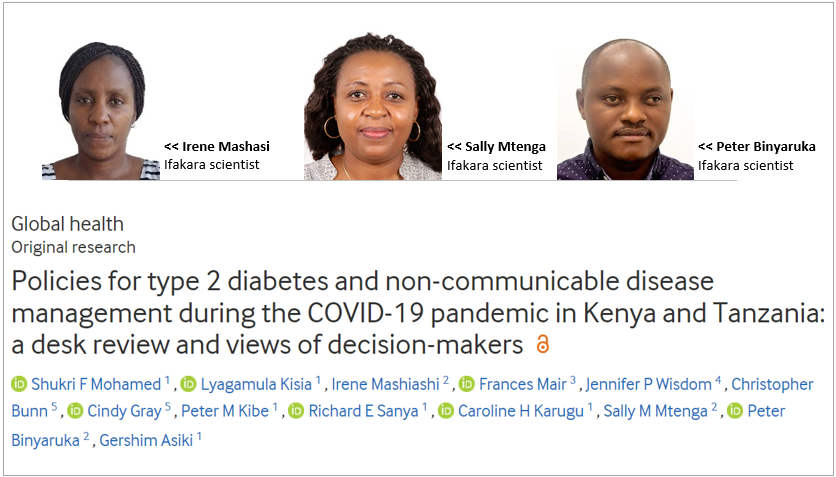
HEALTHCARE: Why health systems should include NCDs in disaster preparedness plans

In light of the global health crisis caused by COVID-19, which posed challenges to healthcare systems worldwide, particularly in managing non-communicable diseases (NCDs), scientists have underscored the importance of establishing disaster preparedness plans that include NCD care into the healthcare framework.
The scientists, from Kenya, Tanzania, the UK and the USA, investigated the impact of the pandemic on NCD management with a particular focus on diabetes, in Kenya and Tanzania, aiming to identify policy gaps and inform recommendations for future similar crises.
Ifakara Health Institute scientists - Irene Mashasi, Sally Mtenga and Peter Binyaruka – contributed to the study which was recently published on the BMJ Open journal.
Measures taken for NCD care
Through a combination of desk reviews of national frameworks and guidelines and interviews with key stakeholders involved in NCD decision-making, the study reveals that both countries lacked comprehensive plans to ensure the continuity of NCD care before the COVID-19 outbreak. However, efforts were made during the pandemic to update existing policies and develop new ones to guide NCD management.
“This review revealed that prior to the COVID-19 pandemic, both countries did not have comprehensive policies/guidelines that addressed the management of NCDs during pandemic/emergency situations. However, several measures were put in place during the COVID-19 period to address the needs of patients with NCD and T2DM such as updating and developing strategic plans; development of new care guidelines; and release of government directives that guided continuity of care strategies.”
Implementation challenges
Despite these efforts, the study found that implementation faced numerous challenges. While measures such as extended medication supplies were implemented to ensure continuity of care for NCD patients during the pandemic, attention to monitoring, evaluation, and implementation issues remained lacking.
The study also found disruption of healthcare services for NCD patients in both countries during the initial phase of the pandemic. Access to NCD care services was severely affected, with supply chain issues leading to shortages of essential medicines. Fear of contracting COVID-19, advice from healthcare providers, and lockdown restrictions further contributed to patients' inability to access necessary care.
Recommendations for future crises
Following these findings, the scientists emphasize the importance of addressing these gaps to better prepare healthcare systems for future emergencies. " Health systems need to establish disaster preparedness plans that integrate attention to NCD care to enable them to better handle severe disruptions caused by emergencies such as pandemics,” recommended the scientist.
“Such guidance needs to include contingency planning to enable adequate resources for NCD care and must also address evaluation of implementation effectiveness.”
The scientists also emphasized the need to promote and build capacities for implementation research in Kenya and Tanzania that address similar issues.
Contributors of the study
The study contributors include Shukri Mohamed, the lead author from the African Population and Health Research Center (APHRC) in Kenya, along with Lyagamula Kisia, Peter Kibe, Richard Sanya, and Caroline Karugu, also affiliated with the same institution.
Other contributors include Irene Mashasi, Sally Mtenga and Peter Binyaruka from the Ifakara Health Institute, Frances Mair, Christopher Bunn and Cindy Gray from the University of Glasgow in UK, and Jennifer Wisdom from Wisdom Consulting, in the USA
Read the full publication here.
